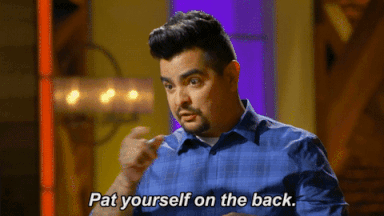Just to clear the air: We all have weaknesses. No one can be good at everything. But luckily, you don’t need to be anyway. However, when it comes to interviewing for a job or internship, you clam up when an interviewer asks, “What are your weaknesses?” Straight up sharing your weaknesses can feel like discounting yourself and can damage your confidence. While it may be a necessary evil, you don’t have to let it hurt you or your chances. With just a few tweaks to your language, you can make your weaknesses work in your favor.
Learn how to answer the question, “what are your weaknesses?” like a boss.
Start by Focusing on the Good

Take a moment to reflect on your strengths. People—college students in particular—often hesitate to name or even understate their strengths so they don’t come off as conceited or boastful. Don’t. Of course, you shouldn’t say, “I’m the best writer in the entire world” or something else ridiculously grandiose, but you don’t want to discount yourself, either. Saying, “I feel that I’m a very strong writer” or “[insert type of writing here] is one of my greatest strengths,” not only lets you honestly share your talents, but also makes you come off as more confident. You’ll look more responsible and attractive to the employer.
From here, transition into looking for the upsides to some of your weaknesses: “I’m a perfectionist which can sometimes slow me down… but at the same time it means that I pay attention to the small details which really helps me when I’m editing,” said University of Central Florida alumna Shana Medel. In this way, looking for the good in the not-so-good not only gives you more skills to bring up but also shows your ability to reflect on yourself.
Plus it can also somewhat counteract some of your weaker skills or qualities. For example, if you, like me, are somewhat stubborn, you can say something like, “I do tend to get frustrated when things don’t work out, however, this means that I’m very persistent and don’t stop working until I get the job done.”
“Realize that admitting you are not good with something is actually a strength as it shows self-awareness and honesty,” said American University Public Relations and Strategic Communications Professor Scott Talan. Having the ability to be open about yourself and what you can and cannot do will absolutely be admirable to the interviewer. Remember that telling the truth will not only set you free but may also earn you that job (and brownie points).
Put a Positive Spin on the “Bad”

“Know that everything, big or small, positive and negative, is a learning opportunity,” said American University junior Steph Black. Use this fact to boost your confidence and to remember that weaknesses are natural and merely exist as skills you need to develop. “You can turn most ‘bad qualities’ into strengths just by finding the right ways to frame and discuss them,” said Medel.
You don’t want to lie, but you also don’t want to—or have to—reveal everything. Medel said, “Don’t know how to use a certain kind of software required for the job? You’ve used similar software elsewhere, you’re a quick learner, you have a friend who can teach you before your first day.” Admitting this during an interview not only prevents you from being given a project that you can’t do because you lied about your skills but also shows the depth of your knowledge in the field and a willingness to learn.
This can also apply to less field-specific skills: “Have trouble with time management? Tell your interviewer you are an expert at scheduling and blocking your time using planners and phone apps,” said Black. “Soft skills” like time management, problem-solving and cooperation are easily overlooked, despite being as important than the knowledge-based “hard skills” you need for a job.
Working these topics into the conversation will not only support you as a candidate but also show that you’re capable of recognizing their relevance to a work experience. Soft skills are more important than you think. Even if you haven’t mastered the hard skills but can show that you work well with others, you’re more likely to get the job because of your willingness to learn and ability to integrate so easily into the environment.
“[Turning a weakness into a strength is] part of creating a bridge from where you currently are to where you could or would want to be and where your employer needs you to be,” said Talan. “I’m personally not that strong with Excel… But if this came up in an interview, I’d admit my proficiency isn’t where it could be and then say… that I’ll work with those at the organization to improve my Excel skills.” Taking this “step further” shows that you want to learn and find a way to benefit the company out in your role.
You can also use this to say something like, “I’m not great at photography, but I hope that through the assignments this job entails, I’ll be able to hone my skills and improve over time.” Like when writing a cover letter, this lets you show off your knowledge of the position and the company, as well as what you hope to give and get from the job, basically checking off four boxes all at once. “Know ahead of time that these questions are going to come up. Re-read the job description. Research the company and the person interviewing you. And know that you are capable of doing the job you’re applying to,” said Black.
And Just Be Honest

Honesty is the best policy. Be open and truthful about who you are and your skills. Opportunities will fall into your lap—sometimes literally. “When I first started at ABC News I got a LinkedIn message from an executive at Internews. I had never heard of them, but this person felt I could be their Country Director based out of Baku, Azerbaijan and train local journalists. I asked him why? He said, ‘You’ve been a Mayor, so you can lead groups, and you’ve worked in TV news, so you know the content…’ I hadn’t looked at myself that way in terms of combing different career parts that I had together,” said Talan.
Maybe you volunteered at a local library sorting books. Even if you’re trying to get a job at a programming firm, you may have knowledge of algorithms or sorting methods that could help you out or even just organization skills that could make coding easier.
Working at restaurants or in retail, too, can teach you a lot about sales, customer service and patience, which apply to so many fields. “Do you have over a thousand Instagram follows? Great! You understand how to connect with audiences, brand yourself, communicate digitally, etc.,” said Black. Humble brag about your bomb AF Instagram or Twitter. It shows that not only are you able to curate content, but if a company doesn’t have a positive or even existent social media presence, you can help to create one for them.
Share what you’ve accomplished. Brag about what makes you proud. You never know where might take you. And if we’re being honest about weaknesses—we deserve to brag more about strengths.




















